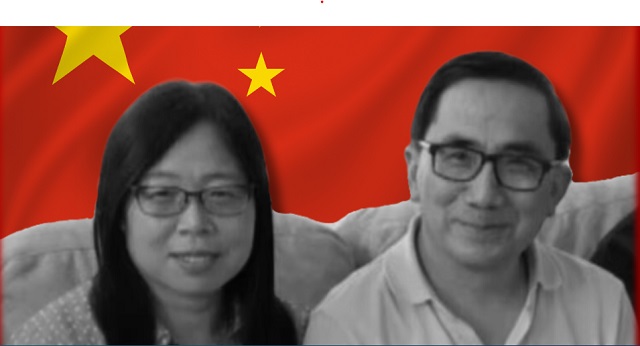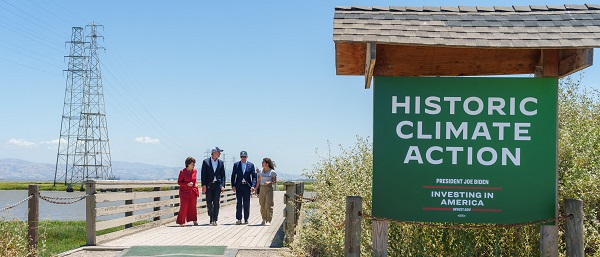espionage
The Scientists Who Came in From the Cold: Canada’s National Microbiology Laboratory Scandal, Part I

From the C2C Journal
By Peter Shawn Taylor
In a breathless 1999 article on the opening of Canada’s top-security National Microbiology Laboratory (NML) in Winnipeg, the Canadian Medical Association Journal described the facility as “the place where science fiction movies would be shot.” The writer was fascinated by the various containment devices and security measures designed to keep “the bad boys from the world of virology: Ebola, Marburg, Lassa” from escaping. But what if insiders could easily evade all those sci-fi features in order to help Canada’s enemies? In the first of a two-part series, Peter Shawn Taylor looks into the trove of newly-unclassified evidence regarding the role of NML scientists Xiangguo Qiu and Keding Cheng in aiding China’s expanding quest for the study – and potential military use – of those virus bad boys.
espionage
Breaking: P.E.I. Urges RCMP Probe of Alleged Foreign Interference, Money Laundering

The Great Enlightment Buddhist Academy, PEI
Prince Edward Island’s government has formally asked the RCMP to investigate allegations of foreign interference and money laundering tied to Buddhist-affiliated organizations operating in the province — an escalation that follows The Bureau’s reporting and last week’s press conference on Parliament Hill calling for a federal public inquiry.
In a letter sent today to RCMP Commissioner Michael Duheme, Premier Rob Lantz and Minister of Housing Cory Deagle urge federal authorities to “review any evidence available, engage with the individuals who have made these claims, and conduct an investigation into any wrongdoing.” A companion letter was sent to FINTRAC, asking Canada’s financial intelligence unit to assess whether regulatory action is warranted.
The government move comes a week after The Bureau reported on findings presented at an October 8 news conference tied to the book Canada Under Siege: How P.E.I. Became a Forward Operating Base for the Chinese Communist Party.
In a following op-ed, co-author Garry Clement said the press conference had “set down a marker: Canada has entered a new era of contestation — over influence, sovereignty, and the integrity of its democratic institutions.” In related coverage by CBC, representatives of the religious groups have denied any links to the Chinese Communist Party or any improper dealings.
Clement and co-authors argued that the allegations demand “action, reform, and reckoning,” and called for a federal public inquiry with full powers — an appeal joined by former Solicitor General and long-time P.E.I. MP Wayne Easter, who urged an inquiry capable of compelling testimony and documents.
The Bureau also revealed a development that stunned Islanders: a response subpoenaed by P.E.I. lawmakers showed that an anticipated 2016–2018 Island Regulatory and Appeals Commission (IRAC) investigation into Buddhist-linked land holdings was never completed. A January 26, 2018 letter from IRAC’s appointed counsel notified firms representing the groups that the section 15 probe “has ended,” without public findings or any explanation of who ordered the closure or why. The disclosure raised fresh questions about oversight and potential conflicts, and now forms part of the backdrop to the province’s formal request for federal action.
The Bureau contacted IRAC last week with questions related to the agency’s management, including counsel relationships and prior positions within P.E.I. legal networks. New developments on this breaking story will be reported.
Today’s letter to RCMP Commissioner Duheme from the P.E.I. government explicitly references the October 8 statements by a former Solicitor General of Canada and a former RCMP Superintendent, noting it was “suggested that information exists that could provide grounds for a criminal investigation.” The Premier further flags assertions that P.E.I. has been used as “a forward operating base for the Chinese Communist Party,” calling the claim “serious” and stating it must be examined by federal agencies to determine whether any factual basis exists.
The province also points to what it describes as a newly mandated and ongoing investigation by IRAC into land holdings “associated with some of the same entities referenced in the public allegations,” using powers expanded in 2022 under the Lands Protection Act. Any findings with criminal or national-security implications, the letter says, will be referred to federal authorities.
The Bureau is a reader-supported publication.
To receive new posts and support my work, consider becoming a free or paid subscriber.
Crime
Canadian Sovereignty at Stake: Stunning Testimony at Security Hearing in Ottawa from Sam Cooper

Canada’s Border Vulnerabilities: Confronting Transnational Crime and Legal Failures
The Bureau has chosen to publish the full opening statement of founder Sam Cooper before the House of Commons Standing Committee on Public Safety and National Security, during the session titled “Canada–United States Border Management,” held on Tuesday, October 7, 2025, and webcast live at https://www.ourcommons.ca/
https://www.ourcommons.ca/Committees/en/SECU/Meetings?utm_source=substack&utm_medium=email
I offer these remarks and recommendations with humility. I’m still learning every day. I speak regularly with numerous law-enforcement and security professionals in both the United States and Canada. For over a decade, I’ve focused professionally on the threats that transnational crime poses to Canada’s borders, institutions, and people, alongside deep reporting on our financial and legal vulnerabilities to threat networks that often include ties to hostile state activity. Canada’s recent terror designation of the India-based Bishnoi gang is important. But that particular action recognizes only one facet of the many-sided transnational fentanyl, human-trafficking, Chinese-supplied chemical precursor, weapons-trafficking, terror and extremism threats that I will discuss today.
Across hundreds of interviews with Canadian and U.S. experts, I have come to a conclusion: many Canadians — including citizens, lawmakers, and judges — do not yet fully understand the scope and nature of the problem, and also seem defensive in engaging it. And if we don’t understand it, we cannot solve it.
In these politically divisive times, I hope I can add value by relaying, clearly and fairly, what professionals on both sides of the border are saying about the cultural, legal, and political differences that impede cooperation between the United States and Canada. My reporting has emphasized Canadian enforcement challenges — not to be unduly critical of my homeland, but because I think we should focus first on the levers we control, and reforms we should have already tackled decades ago.
This isn’t my opinion only. As you know, Canadian Association Police Chiefs president Thomas Carrique recently warned that police are being asked to confront a new wave of transnational threats with “outdated and inadequate” laws “never designed to address today’s criminal landscape.” He added that Canada would have been far better positioned to “disrupt” organized crime had Ottawa acted on reforms first recommended in the early 2000s.
As RCMP Assistant Commissioner David Teboul said this year after the discovery of major fentanyl labs in British Columbia — notable for their commercial-grade chemistry equipment and scientific expertise — “There’s a need for legislative reform around how such equipment and precursor chemicals can be obtained.” More border regulations could help, but will not be sufficient absent foundational legal change.
It has long been my experience in discussions with senior U.S. enforcement experts that American and Australian police can collaborate effectively because the two nations are able to authorize wiretaps on dangerous transnational suspects within days. In Canada, that speed is impossible, and it has become a major obstacle.
As former RCMP investigator Calvin Chrustie testified before British Columbia’s Cullen Commission several years ago, due to judicial blockages arising from Charter of Rights rulings, it had become practically impossible to obtain timely wiretaps on Sinaloa Cartel targets in Vancouver. In recent years, such delays in sensitive investigations have undermined cooperation between the RCMP and the U.S. Drug Enforcement Administration in major cases of fentanyl trafficking and drug money laundering. In 2017, I was personally alerted to these longstanding concerns about the breakdown in RCMP–DEA cooperation by a U.S. State Department official.
These impeded investigations have involved the upper echelons of Chinese Triads, which maintain deep global leadership in Canada and align with Chinese state-interference networks, as well as senior Iranian and Hezbollah-linked networks operating here. Both networks are engaged in fentanyl trafficking and money laundering in collaboration with Mexican cartels active in Canada.
Canada must urgently reform what it can fix on our side.
My first recommendation is this — there is no “low-hanging fruit.” I have not spoken to a single knowledgeable Canadian officer — current or former — who believes that simply spending more on personnel, equipment, training, or border staffing will solve this. What I hear is that, from ten to twenty years ago, before the evolution of Charter-driven disclosure and delay jurisprudence in Canada, our nations enjoyed a much closer enforcement relationship. Experts point above all to two Supreme Court rulings — Stinchcombe and Jordan — as the core legal obstacles. Our Stinchcombe disclosure standards and Jordan time restrictions, as applied, disincentivize complex, multi-jurisdictional cases and deter U.S. partners from sharing sensitive intelligence that could be exposed in open court. Veterans describe enterprise files stalling for lack of approvals or because specialized techniques are denied. When police and prosecutors anticipate disclosure fights they cannot resource — and trial deadlines they cannot meet — the rational choice is to avoid the fight altogether.
I can explain in greater detail, but without question these rulings have devastated Canada’s ability to prosecute sophisticated organized crime. The result is a vicious circle of non-prosecution and impunity. To deny the need for deep legal reform is to deny the depth of the problem.
To sum up, my reporting at The Bureau has highlighted interlocking failures — legal, political, and bureaucratic — that have turned Canada into a permissive platform for synthetic narcotics and criminal finance, badly misaligning us with our Five Eyes law-enforcement and intelligence partners, and bringing us to the brink of a rupture with the United States.
Thanks for your attention, Chairman and Members.
The Bureau is a reader-supported publication.
To receive new posts and support my work, consider becoming a free or paid subscriber.
-

 Alberta2 days ago
Alberta2 days agoClick here to help choose Alberta’s new licence plate design
-

 espionage21 hours ago
espionage21 hours agoBreaking: P.E.I. Urges RCMP Probe of Alleged Foreign Interference, Money Laundering
-

 Business1 day ago
Business1 day ago‘Taxation Without Representation’: Trump Admin Battles UN Over Global Carbon Tax
-

 International2 days ago
International2 days agoDaughter convinces healthy father to die in double assisted suicide with mother
-

 Alberta1 day ago
Alberta1 day agoPremier Smith addresses the most important issue facing Alberta teachers: Classroom Complexity
-

 Alberta1 day ago
Alberta1 day agoAlberta taxpayers should know how much their municipal governments spend
-

 National2 days ago
National2 days agoDemocracy Watch Renews Push for Independent Prosecutor in SNC-Lavalin Case
-

 International1 day ago
International1 day agoHamas will disarm or die
 No happy endings here:
No happy endings here:  Internationally-renowned virologist Xiangguo Qiu (top left) and her husband, biologist Keding Cheng (top right), both worked at Winnipeg’s National Microbiology Laboratory (NML) until they were escorted off the premises in July 2019 for what was initially described as an “administrative matter”. (Sources of photos: (top left)
Internationally-renowned virologist Xiangguo Qiu (top left) and her husband, biologist Keding Cheng (top right), both worked at Winnipeg’s National Microbiology Laboratory (NML) until they were escorted off the premises in July 2019 for what was initially described as an “administrative matter”. (Sources of photos: (top left) 
 A look behind the curtain: Made public in February 2024, the 623-page collection of formerly-classified documents includes (from left to right) a third-party investigation into Qiu and Cheng, secret “Canadian Eyes Only” reports from the Canadian Security Intelligence Service (CSIS) and the pair’s own response to accusations made against them.
A look behind the curtain: Made public in February 2024, the 623-page collection of formerly-classified documents includes (from left to right) a third-party investigation into Qiu and Cheng, secret “Canadian Eyes Only” reports from the Canadian Security Intelligence Service (CSIS) and the pair’s own response to accusations made against them. “For the RCMP to go into the lab and remove the scientists…it had to be more than a personnel matter,” says John Williamson, a Conservative MP from New Brunswick. Williamson was the only Conservative member on the ad hoc committee of four MPs given access to the entire file of classified documents ahead of their public release. (Source of photo:
“For the RCMP to go into the lab and remove the scientists…it had to be more than a personnel matter,” says John Williamson, a Conservative MP from New Brunswick. Williamson was the only Conservative member on the ad hoc committee of four MPs given access to the entire file of classified documents ahead of their public release. (Source of photo:  “Scientists need to do what scientists do”: Initial investigations by the PHAC and CSIS revealed that Qiu and Cheng shared a surprisingly carefree attitude towards security rules, despite working in Canada’s only Level 4 Biosafety Laboratory. Shown, Qiu at work in her Winnipeg lab. (Source of photo:
“Scientists need to do what scientists do”: Initial investigations by the PHAC and CSIS revealed that Qiu and Cheng shared a surprisingly carefree attitude towards security rules, despite working in Canada’s only Level 4 Biosafety Laboratory. Shown, Qiu at work in her Winnipeg lab. (Source of photo:  The plot unfolds: The first CSIS investigation revealed that Qiu had conducted joint research with scientists at China’s Academy of Military Medical Sciences (shown). Despite this worrisome connection, CSIS was initially reluctant to categorize Qiu as a security risk. (Source of photo:
The plot unfolds: The first CSIS investigation revealed that Qiu had conducted joint research with scientists at China’s Academy of Military Medical Sciences (shown). Despite this worrisome connection, CSIS was initially reluctant to categorize Qiu as a security risk. (Source of photo:  CSIS reopened its investigation into Qiu and Cheng after “newly discovered information” cast doubt on Qiu’s loyalty to Canada due to her “close and clandestine relationships with a variety of entities of the People’s Republic of China.”
CSIS reopened its investigation into Qiu and Cheng after “newly discovered information” cast doubt on Qiu’s loyalty to Canada due to her “close and clandestine relationships with a variety of entities of the People’s Republic of China.” A talent for espionage: According to the FBI, China’s many “talent” programs usually involve “undisclosed and illegal transfers of information, technology, or intellectual property” from western countries to China.
A talent for espionage: According to the FBI, China’s many “talent” programs usually involve “undisclosed and illegal transfers of information, technology, or intellectual property” from western countries to China. “The only highly experienced Chinese expert available”: CSIS uncovered documents revealing that Qiu was considered essential to the research ambitions of the Wuhan Institute of Virology (shown), an institution with close ties to the Chinese military and infamous for its proximity, and likely connection, to the initial outbreak of Covid-19. (Source of photo: AP Photo/Ng Han Guan)
“The only highly experienced Chinese expert available”: CSIS uncovered documents revealing that Qiu was considered essential to the research ambitions of the Wuhan Institute of Virology (shown), an institution with close ties to the Chinese military and infamous for its proximity, and likely connection, to the initial outbreak of Covid-19. (Source of photo: AP Photo/Ng Han Guan) Bosom buddies: Shi Zhengli, WIV’s deputy-director and often referred to as “bat-woman” (left), and Major-General Chen Wei, China’s “top biowarfare expert” (right), frequently collaborated with Qiu during her time at the NML. (Source of left photo: Chinatopix via AP, File)
Bosom buddies: Shi Zhengli, WIV’s deputy-director and often referred to as “bat-woman” (left), and Major-General Chen Wei, China’s “top biowarfare expert” (right), frequently collaborated with Qiu during her time at the NML. (Source of left photo: Chinatopix via AP, File) Scrubbed clean: Qiu held multiple positions at Chinese universities as early as April 2016, but hid these facts from PHAC management and lied about them in her initial interview with CSIS.
Scrubbed clean: Qiu held multiple positions at Chinese universities as early as April 2016, but hid these facts from PHAC management and lied about them in her initial interview with CSIS. “There are no ethical boundaries to Beijing’s pursuit of power”: Former U.S. Director of National Intelligence John Ratcliffe raised the alarm about China’s biowarfare ambitions in 2020, noting that China has “conducted human testing on members of the People’s Liberation Army in hope of developing soldiers with biologically enhanced capabilities.” (Source of photo:
“There are no ethical boundaries to Beijing’s pursuit of power”: Former U.S. Director of National Intelligence John Ratcliffe raised the alarm about China’s biowarfare ambitions in 2020, noting that China has “conducted human testing on members of the People’s Liberation Army in hope of developing soldiers with biologically enhanced capabilities.” (Source of photo:  Spies happily ever-after: According to a Globe and Mail investigation, Qiu and Cheng currently live in China and are each employed in their chosen fields. Curiously, they appear to have adopted new names – Sandra Chiu and Kaiting Cheng.
Spies happily ever-after: According to a Globe and Mail investigation, Qiu and Cheng currently live in China and are each employed in their chosen fields. Curiously, they appear to have adopted new names – Sandra Chiu and Kaiting Cheng.



